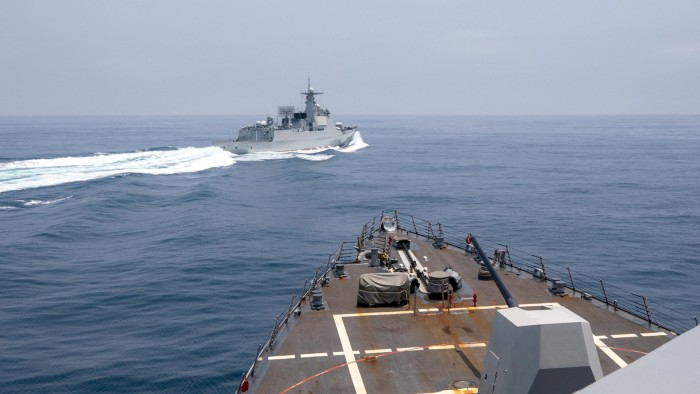Unlock the White House Watch newsletter for free
Your guide to what the 2024 US election means for Washington and the world
The writer is a former US deputy assistant secretary of defence for east Asia
For decades, the US has relied on a policy of strategic ambiguity to deter conflict across the Taiwan Strait. By deliberately leaving uncertain how Washington would respond to a Chinese attack on Taiwan, the aim was to deter Beijing from aggression while also discouraging Taipei from declaring formal independence. For much of the post-cold war period, this approach succeeded.
But that era is over. With the Trump administration’s frontal assault on the post-second world war order, strategic ambiguity is no longer a sustainable or effective policy. A new framework that combines strategic clarity with a comprehensive approach to maintaining peace in the Taiwan Strait is essential to prevent so-called greyzone coercion flaring into outright war.
For decades, a fragile status quo held firm in the Taiwan Strait, with stability underwritten by the US military presence. But that stability is unravelling under mounting pressure from China on one side, and President Donald Trump’s determination to reshape global affairs on the other.
In recent years China has steadily intensified its coercive campaign against Taiwan. Chinese military incursions into Taiwan’s air defence identification zone have grown more frequent, with Beijing repeatedly staging aggressive exercises near the island. At the same time, it has increased diplomatic pressure on Taipei.
Washington’s reliance on ambiguity is no longer deterring Beijing’s increasingly aggressive posture — and it is ill-equipped to prevent a dangerous miscalculation. Beijing has pursued an integrated strategy on Taiwan that combines diplomatic isolation, economic entanglement, political influence campaigns, cultural narratives and military intimidation.
Having remained overly focused on military deterrence, the US struggles to match China’s multidimensional approach. In order to stabilise cross-Strait relations, Washington must complement its military posture with economic, diplomatic and informational initiatives.
Today, Taiwan is the world’s most critical hub for semiconductor manufacturing, producing over 60 per cent of the world’s chips and an overwhelming majority of the most advanced semiconductors. Uncertainty, let alone conflict, that disrupts this industry would have severe global repercussions. And beyond semiconductors, Taiwan’s central position in high-tech supply chains has heightened its economic significance. The US cannot afford to rely solely on military deterrence to protect such vital economic interests.
US foreign policy in the early days of the second Trump administration has further exacerbated the risks here. Ambiguous remarks about Taiwan’s semiconductor industry, implying its dominance in the sector is a strategic “bargaining chip”, have fuelled anxiety in Taipei and emboldened Beijing. Meanwhile, inconsistent US support for Ukraine, antagonism towards America’s European allies, and territorial designs on Greenland and Panama, and even Canada, has undermined confidence in Washington’s broader commitment to defending democratic partners and international institutions and norms.
In this context, ambiguity no longer deters aggression — it invites miscalculation. Clarity, by contrast, can restore deterrence by underlining the costs China would face if it pursued aggression or coercion against Taiwan.
Shifting to a policy of strategic clarity does not require the US to abandon its “One China” policy, withdraw from the three joint communiqués with China or undermine the Taiwan Relations Act. It can maintain these diplomatic foundations while still clearly outlining the consequences of coercive action or military aggression by Beijing.
The US should explicitly state that any attempt by China to enforce unification through military means or by economic coercion would have severe consequences. This would signal to Beijing that aggression will be met with a robust and co-ordinated response, without crossing Chinese red lines by formally recognising Taiwan as an independent state. At the same time, Washington should actively strengthen Taiwan’s diplomatic standing, expand economic ties with the island and increase its engagement with regional partners to reinforce Taiwan’s security.
By adopting a policy of strategic clarity the US can deter conflict, restore regional stability and protect the global economy. In an era in which the centre is no longer holding, clear conviction is essential. Ambiguity once served the cause of peace across the Taiwan Strait. Today, clarity is needed to preserve it.
Source link









